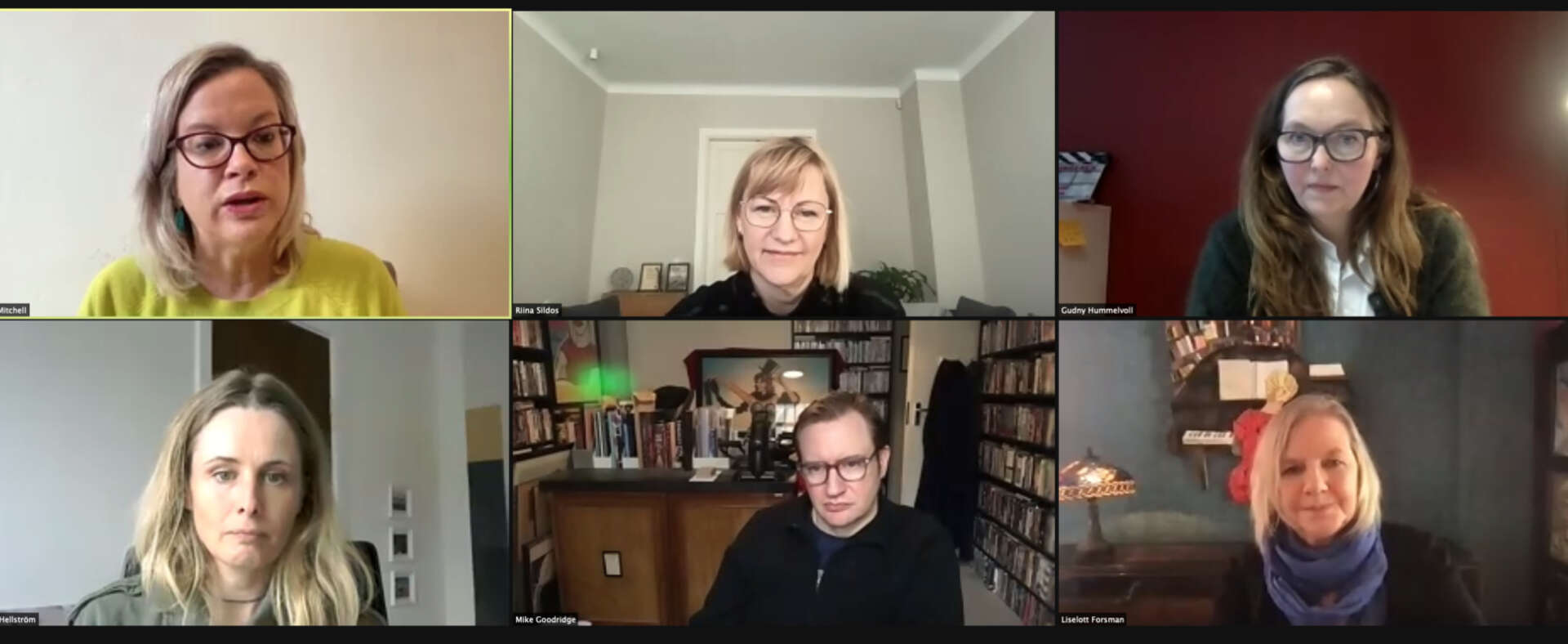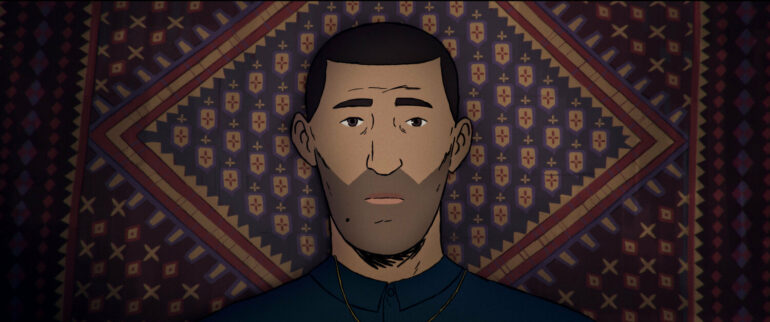
“Stick together, trust your partners and be passionate” say Co-Production panellists at EFM
4 MARCH 2021
How do producers find their co-production partners, adapt to the digital shift and navigate through Covid-19 were some of the topics discussed on Tuesday at Scandinavian Films’ European Film Market webinar.
The panel “Joining Forces, collaborating for strong co-productions" was attended by Liselott Forsman, CEO Nordisk Film & TV Fond, Mike Goodridge, producer Good Chaos (UK) Monica Hellström, producer, Final Cut for Real (Denmark), Gudny Hummelvoll, producer, Hummefilm, president European Producers Club (Norway) and Riina Sildos, producer, founder of Amrion Productions (Estonia). The discussion was moderated by journalist and festival consultant Wendy Mitchell.
Asked how they were experiencing co-producing with the Nordics and/or Europe, each producer gave snap examples of their most recent productions.
Mike Goodridge, UK co-producer of Ruben Östlund’s highly anticipated Triangle of Sadness, produced by Plattform, said he was interested in boarding the project shot in English, with a cast including UK actor Harris Dickinson, and approached sales agent and co-producer Philippe Bober to see how he could take part in the project. Goodridge was delighted to be able to contribute to the complex financial structure involving Swedish, Danish, French, German, Greek, UK partners by bringing on board the British Film Institute and BBC Films, although melding the UK and continental European legal systems was challenging.
Regarding Brexit, the UK producer said he doesn’t know yet the impact it will have on co-productions, but underlined that the UK funding bodies are “looking at all options”. “It might be the opportunity to make ourselves more aggressive with working with the rest of the world,” said Goodridge, who is “open to films that might not necessarily fit into a rigid UK box”. The Nordic-centric producer said he is attached to projects with Iceland’s Grímar Jónsson (Netop Films) and Finland’s Petri Jokaranta.
Final Cut for Real’s Monica Hellström said the Sundance winner docu-animated Flee by Jonas Poher Rasmussen was put together organically, with Denmark’s animated specialist Sun Creature Studio Denmark who contacted their French partners Vivement Lundi!. Then Sweden’s Mosfilm that Hellström had met at EAVE came on board and Norway’s Mer Film, who brought in notably Eskil Vogt as script consultant.
“Thanks to co-productions, over time, you get to know creative people and building a team of talents across borders simply makes a film better,” said the producer who also enjoyed “having French eyes, and a new perspective from them which enriched the creators’ vision.
Amrion’s Riina Sildos, Estonian co-producer of the Finnish feature Compartment Number 6 by Juho Kuosmanen, said she first met the director at an EAVE workshop and they developed the film together from script stage, with the delegate producer Jussi Rantamäki of Aamu Film Company. The film being set in Russia, Sildos who has a long experience of working with Russia, brought in the Russian partners CTB. The film was eventually set up as a Finnish/Estonia/Russian/German co-production. “Estonia being small, we simply have to co-produce, “ noted Sildos, who so far has worked predominantly with Finnish partners within the Nordic region, due to cultural affinities and geographical proximity.
The producer welcomed the positive influence of the TV drama boom, which is widening co-production opportunities. “Talents have global appeal, and more projects get made with European and non-European partners. It’s a new trend that I appreciate,” she said.
Hummelfilm’s Gudny Hummelvoll also underlined the positive spill-over effect of TV drama on the Nordic industry, (notably the Nordic 12 pubcasters collaboration) which has improved cross-border distribution and talent visibility.
Regarding global streamers’ aggressive push into the Nordic market and disruption of the traditional financing model, Hummelvoll said some projects are benefiting from it and flexibility is key, however she insisted that indie European producers have to stick together and to the existing co-production schemes, to protect diversity and a shared culture. “We have to keep the voice of Europe alive,” she claimed.
Nordisk Film & TV Fond’s Liselott Forsman underlined the Fund’s role in promoting quality, cross-border distribution in the Nordics, and in creating bridges for the industry within and beyond Nordic borders. Forsman mentioned the Fund’s new Audiovisual Collaboration 2021 and next panel discussion about the changing Europe with key MEDIA Programme representatives [March 15 - CLICK HERE]. “We do not provide financial support to non-Nordic applications, but we do support them strategically”, she said, referring to the Fund’s bridge building initiative, support to international networking events and practical tools such as the ‘Co-producing with the Nordic Countries’ brochure.
Quizzed about the impact of Covid-19 on co-productions, the panellists shared their experiences with shifted production and distribution schedules, and mitigating government measures.
Forsman announced that the Fund has commissioned a report which will provide an in-depth analysis on the economic impact of the pandemic in the Nordics, from a content point of view, with detailed restriction and mitigating measures per territory. “The report which has looked at 155 Nordic projects, reveals that production costs increased by about 10% and the most impacted were drama series, followed by feature films and documentary films. But overall, one of the main findings is that the Nordic industry has shown exceptional strong resilience,” she said.
The report - free of charge - ‘Nordic Mission Impossible: An Assessment of Covid-19’s Impact on the Nordic Audiovisual Industry and the Effectiveness of Government and Industry Measures’ commissioned to Norway’s BI Centre for Creative Industries will be published March 12.
Watch out for the publication on our website.
